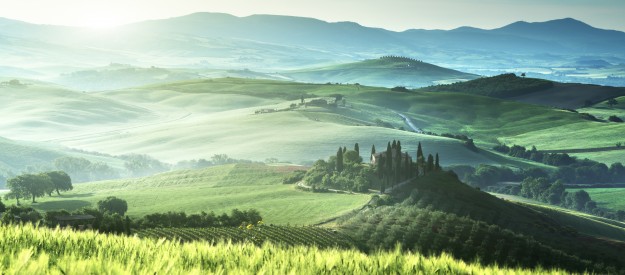"We are losing our attitude of wonder, of contemplation, of listening to creation and thus we no longer manage to interpret within it what Benedict XVI calls 'the rhythm of the love-story between God and man.'"
+ Pope Francis
Pope Francis's first message for World Day of Peace: finding the "grammar" of creation

Pope Francis issued today his 2014 Message for World Day of Peace.
While the day falls on January 1st, it is customary for popes to issue the message a few weeks early. This is helpful as these pontifical messages are important and call for much reflection.
Francis’s is no exception. His guiding theme of “fraternity” reminds us that this human reality builds up a variety of other realities that build up peace on earth. His reflections on Christ-centered fraternity provide helpful context for his recently released apostolic exhortation, which so many are commenting about (including me).
As for the Message for World Day of Peace, here's my only observation for now: Within the section on ecology, you’ll note Francis’s use of the term “grammar,” which he himself places in quotes to acknowledge that the term (used in conjunction with creation) came from someone else. Benedict XVI introduced the concept of a “grammar of creation” in his 2009 encyclical Caritas in Veritate (see §48.) Pope Francis picks up on this and underscores it. I love finding Francis referencing his predecessor (which he does quite often) because it reminds us of the continuity between them—indeed, between all Successors of St. Peter—even if so many think otherwise. (And for a wonderful reflection on the use the term "grammar" in Caritas in Veritate, read David Cloutier’s essay “Working with the Grammar of Creation: Benedict XVI, Wendell Berry, and the Unity of Catholic Moral Vision” in the winter 2010 edition of Communio.)
While there is much more to be said about Francis’s words on peace, there will be time for that later. For now, in these busy days, let us simply read his words—especially those on creation—and allow them to stir within us as we continue on our Advent journey.
Fraternity helps to preserve and cultivate nature
9. The human family has received from the Creator a common gift: nature. The Christian view of creation includes a positive judgement about the legitimacy of interventions on nature if these are meant to be beneficial and are performed responsibly, that is to say, by acknowledging the “grammar” inscribed in nature and by wisely using resources for the benefit of all, with respect for the beauty, finality and usefulness of every living being and its place in the ecosystem. Nature, in a word, is at our disposition and we are called to exercise a responsible stewardship over it. Yet so often we are driven by greed and by the arrogance of dominion, possession, manipulation and exploitation; we do not preserve nature; nor do we respect it or consider it a gracious gift which we must care for and set at the service of our brothers and sisters, including future generations.
In a particular way, the agricultural sector is the primary productive sector with the crucial vocation of cultivating and protecting natural resources in order to feed humanity. In this regard the continuing disgrace of hunger in the world moves me to share with you the question: How are we using the earth’s resources? Contemporary societies should reflect on the hierarchy of priorities to which production is directed. It is a truly pressing duty to use the earth’s resources in such a way that all may be free from hunger. Initiatives and possible solutions are many, and are not limited to an increase in production. It is well known that present production is sufficient, and yet millions of persons continue to suffer and die from hunger, and this is a real scandal. We need, then, to find ways by which all may benefit from the fruits of the earth, not only to avoid the widening gap between those who have more and those who must be content with the crumbs, but above all because it is a question of justice, equality and respect for every human being. In this regard I would like to remind everyone of that necessary universal destination of all goods which is one of the fundamental principles of the Church’s social teaching. Respect for this principle is the essential condition for facilitating an effective and fair access to those essential and primary goods which every person needs and to which he or she has a right.



















